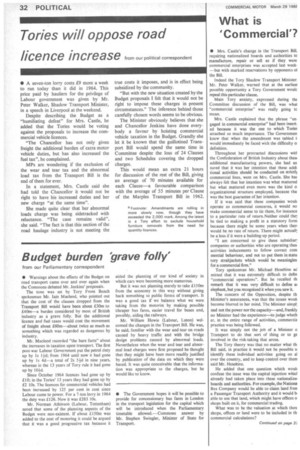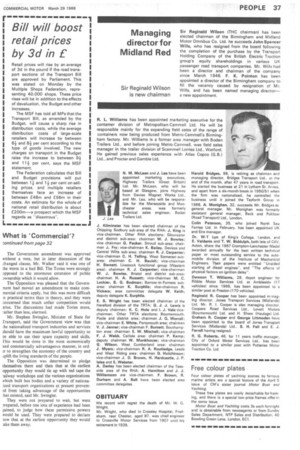What is 'Commercial'?
Page 34

Page 39

If you've noticed an error in this article please click here to report it so we can fix it.
• Mrs. Castle's change in the Transport Bill. requiring nationalized boards and authorities to manufacture, repair or sell as if they were commercial enterprises was accepted last week-but with marked reservations by opponents 01 the Bill.
Indeed the Tory Shadow Transport Minister. Mr. Peter Walker, warned that at the earliest possible opportunity a Tory Government woulc repeal this particular clause.
Main Tory anxiety, expressed during the Committee discussion of the Bill, was what "commercial enterprise" was really going to mean.
Mrs. Castle explained that the phrase "engaged in commercial enterprise" had been inserted because it was the one to which Tories attached so much importance. The Governmeni knew that when the amendment was tabled ii would immediately be faced with the difficulty cr definition.
Throughout her protracted discussions wit!. the Confederation of British Industry about thest additional manufacturing powers, she had as sured that it was her intention that these addi tional activities should be conducted on strictI3 commercial lines, went on Mrs. Castle. She hat always felt that her intention was what mattered but what mattered even more was the kind organizational structure employed, because tha was the best guarantee of her intention.
If it was said that these companies woult operate as commercial concerns, it would no make commercial sense to tie them, for instance to a particular rate of return.Neither could the be tied to making a profit in a statutory form because there might be some years when then! would be no rate of return. There might actual]: be a loss if it were a building-up period.
"I am concerned to give these subsidiar companies or authorities who are operating thes, activities inducements to follow correct com mercial behaviour, and not to put them in statu tory straitjackets which would be meaningleS for a commercial firm."
Tory spokesman Mr. Michael Heseltine ad mitted that it was extremely difficult to defin "commercial operations". But he recalled th remark that it was very difficult to define at elephant, but you recognized it when you saw it.
The concern of the Opposition, despite th Minister's assurances, was that the issues wonti become blurred in her mind. The Minister simpl: nad not the power nor the capacity—and, frankly no Minister had the experience—to judge wheth er, in the entire range of activities, commercia practice was being followed.
It was simply not the job of a Minister a Transport to do that sort of thing or to ge involved in the risk-taking that arose.
The Tory theory was that no matter what th, Bill said, in practice it would not be possible u identify these individual activities going on al over the country, and to keep control over them said Mr. Heseitine.
He added that one question which would confuse the issue was the capital injection whicl already had taken place into these nationalizei boards and authorities. For example, the Nationa Bus Company would be able to claim land fron a Passenger Transport Authority and it would]) able to use that land, which might have offices o shops built on it, for commercial trading.
What was to be the valuation at which thos shops, -offices or land were to be included in th commercial calculations? The Government amendment was approved without a vote, but in later discussion of the changed clause, Mr. Walker said it was one of :he worst in a bad Bill. The Tories were strongly apposed to the enormous extension of public Dwnership which it would allow.
The Opposition was pleased that the Government had moved an amendment to make com:nercial criteria apply, but this was more difficult n practical terms than in theory, and they were oncerned that much unfair competition would arise. The discussions had made Tories more, rather than less, alarmed.
Mr. Stephen Swingler, Minister of State for Transport, said the Government view was that .he nationalized transport industries and services should have the maximum lawful opportunity to le able to use their spare capacity and skills. This would be done in the most economically and commercially advantageous manner, in ordnto strengthen the economy of the country and iplift the living standards of the people.
The Opposition was determined to pledge themselves there and then that at the earliest opportunity they would tie up with red tape the 'ally/ay workshops and the various organizations which built bus bodies and a variety of nationaized transport organizations at present preventrd from taking advantage of the opportunities hat existed, said Mr. Swingler.
They were not prepared to wait, but were )repared, before one iota of experience had been ;rained, to judge how these permissive powers would be used. They were prepared to declare tow that at the earliest opportunity they would ake them away.
























































































































